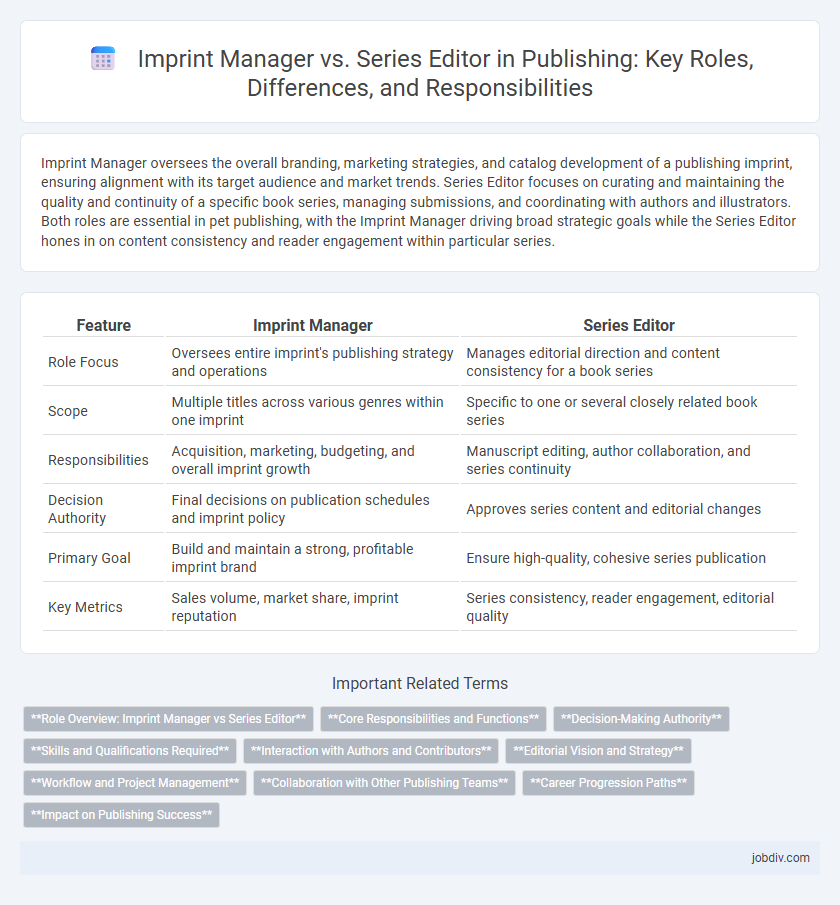Imprint Manager oversees the overall branding, marketing strategies, and catalog development of a publishing imprint, ensuring alignment with its target audience and market trends. Series Editor focuses on curating and maintaining the quality and continuity of a specific book series, managing submissions, and coordinating with authors and illustrators. Both roles are essential in pet publishing, with the Imprint Manager driving broad strategic goals while the Series Editor hones in on content consistency and reader engagement within particular series.
Table of Comparison
| Feature | Imprint Manager | Series Editor |
|---|---|---|
| Role Focus | Oversees entire imprint's publishing strategy and operations | Manages editorial direction and content consistency for a book series |
| Scope | Multiple titles across various genres within one imprint | Specific to one or several closely related book series |
| Responsibilities | Acquisition, marketing, budgeting, and overall imprint growth | Manuscript editing, author collaboration, and series continuity |
| Decision Authority | Final decisions on publication schedules and imprint policy | Approves series content and editorial changes |
| Primary Goal | Build and maintain a strong, profitable imprint brand | Ensure high-quality, cohesive series publication |
| Key Metrics | Sales volume, market share, imprint reputation | Series consistency, reader engagement, editorial quality |
Role Overview: Imprint Manager vs Series Editor
An Imprint Manager oversees the strategic direction, branding, and financial performance of a publishing imprint, ensuring cohesive market positioning and a consistent editorial vision across all titles. In contrast, a Series Editor focuses on the content development, editorial quality, and continuity within a specific book series, managing authors and maintaining thematic coherence. Both roles require collaboration with marketing, editorial, and production teams but differ primarily in scope--imprint managers handle broader organizational and business objectives, while series editors specialize in detailed content curation and series management.
Core Responsibilities and Functions
Imprint Managers oversee the strategic direction and brand identity of a specific imprint, managing marketing, acquisitions, and financial performance to ensure cohesive publishing output. Series Editors focus on the content quality and consistency within a particular series, coordinating with authors, editors, and designers to maintain editorial standards. Both roles contribute to the publication process, but Imprint Managers emphasize business strategy while Series Editors prioritize editorial oversight.
Decision-Making Authority
Imprint Managers hold comprehensive decision-making authority over branding, marketing strategies, and overall editorial direction within a specific publishing imprint. Series Editors focus on content curation, ensuring thematic coherence and editorial quality across a series, with decisions primarily limited to manuscript selection and development. The imprint manager's authority typically encompasses budget allocation and strategic partnerships, while the series editor operates within defined editorial guidelines.
Skills and Qualifications Required
Imprint Managers require strong project management skills, deep knowledge of market trends, and expertise in brand development to establish and maintain a publishing imprint's identity. Series Editors need exceptional editorial judgment, attention to detail, and the ability to coordinate with authors and designers to ensure consistent quality and coherence across a book series. Both roles demand excellent communication skills, industry experience, and an understanding of the publishing workflow.
Interaction with Authors and Contributors
Imprint Managers coordinate closely with authors and contributors to ensure alignment with the publishing brand's vision and marketing strategy, often overseeing contract negotiations and final approvals. Series Editors collaborate directly with authors throughout the development of individual volumes, providing editorial guidance and maintaining consistency in content and style across the series. Both roles require strong communication skills, but Imprint Managers focus on strategic partnerships while Series Editors prioritize detailed creative and editorial interactions.
Editorial Vision and Strategy
Imprint Managers define the overarching editorial vision and strategic direction for the entire imprint, shaping its market positioning and long-term growth. Series Editors focus on maintaining a consistent editorial voice and thematic coherence within a specific series, ensuring alignment with the imprint's goals. Both roles require close collaboration to integrate series-specific content with the broader imprint's publishing strategy.
Workflow and Project Management
Imprint Managers oversee the overall workflow by coordinating multiple projects across various genres, ensuring deadlines and budgets are consistently met. Series Editors focus specifically on managing the content development and editorial stages within a particular series, maintaining thematic continuity and quality control. Effective project management tools tailored to each role optimize communication and track progress, streamlining publication timelines.
Collaboration with Other Publishing Teams
Imprint Managers coordinate closely with marketing, sales, and editorial departments to align brand strategies and ensure consistent messaging across all titles under their imprint. Series Editors work directly with authors, designers, and production teams to maintain continuity and quality throughout a book series. Effective collaboration between these roles enhances overall publishing efficiency and strengthens the market positioning of both individual titles and entire series.
Career Progression Paths
Imprint Manager roles typically involve overseeing multiple titles and guiding the strategic direction of an imprint, often leading to executive positions such as Publishing Director or VP of Publishing. Series Editors focus on managing specific book series, honing skills in editorial consistency and author relations, which can progress into senior editorial or acquisitions roles. Career progression for Imprint Managers generally emphasizes broader leadership responsibilities, while Series Editors advance through specialized editorial expertise within niche markets.
Impact on Publishing Success
Imprint Managers play a crucial role in shaping a publisher's brand identity, directly influencing market positioning and sales growth by curating a cohesive catalog that resonates with target audiences. Series Editors contribute to publishing success by ensuring thematic consistency and quality across titles within a series, enhancing reader loyalty and long-term engagement. The combined efforts of Imprint Managers and Series Editors drive strategic content development, maximizing commercial potential and reinforcing a publisher's competitive advantage.
Imprint Manager vs Series Editor Infographic

 jobdiv.com
jobdiv.com